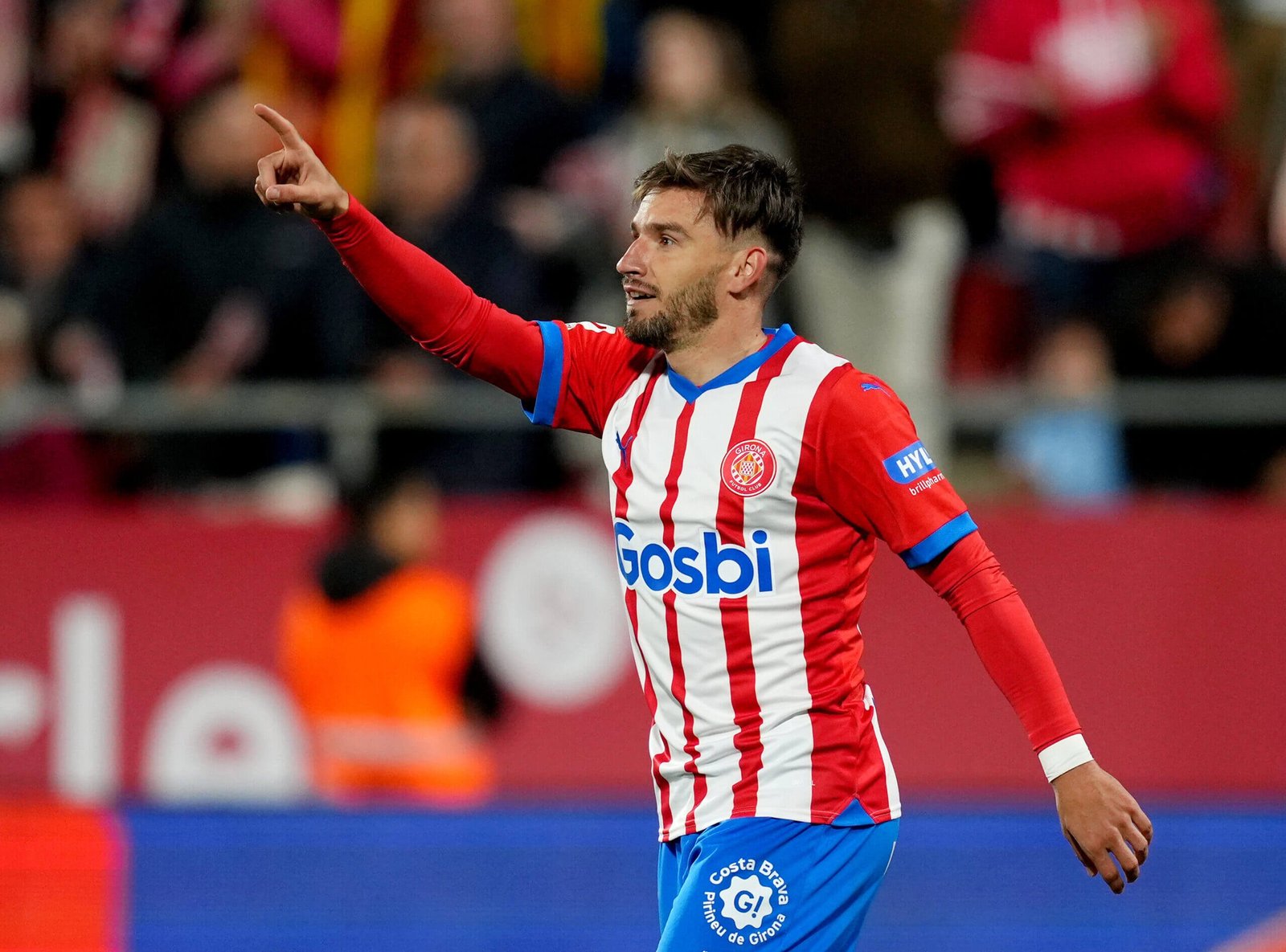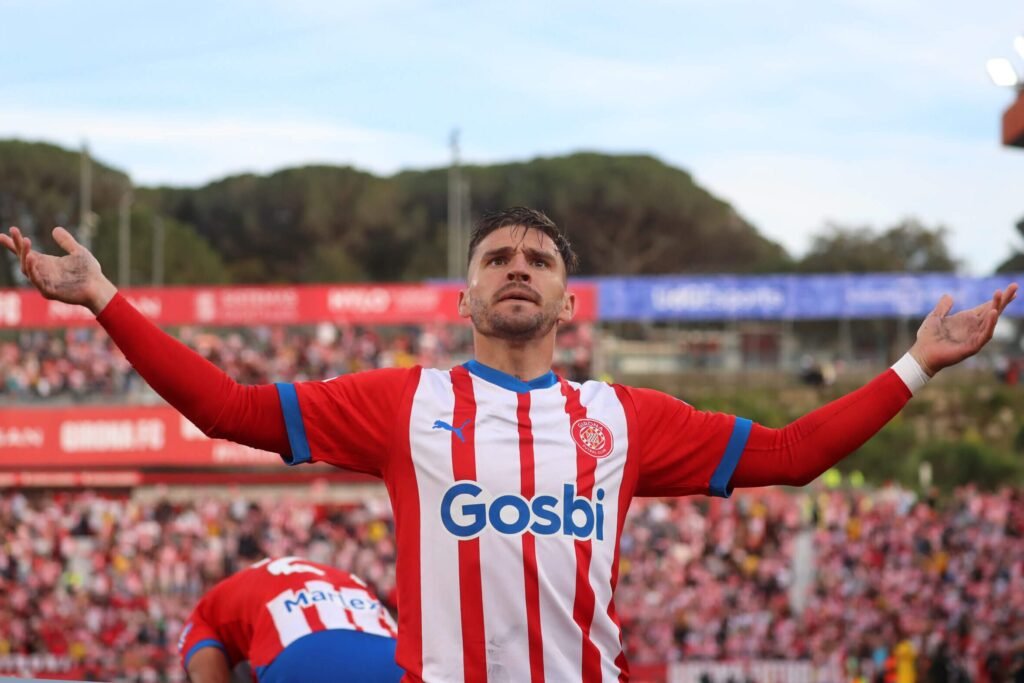“It was beautiful to see Montilivi like that,” Girona winger Portu tells The Athletic.
“These are fans who in my last spell here I saw cry with sadness for being relegated. So to see them now crying with happiness was incredible. It is not just about qualifying for the Champions League, it is the way we have done it, our way of playing.”
Cristian Portugues Manzanera, known as Portu, is speaking days after Girona clinched a place in the Champions League — and any European competition — for the first time with a 4-2 home win against Catalan rivals Barcelona.
The 31-year-old winger from Valencia says the scenes at their Montilivi home would have been unthinkable when he first joined Girona on a free transfer from second-division rivals Albacete in the summer of 2016. But they have become commonplace in a season in which Girona mounted an unlikely title challenge.
“For Girona to qualify for the Champions League, they would say you were crazy. They had never played in Primera (the Spanish top flight), but a lot of work has gone into this,” he says. “This club is small and humble, but its mentality has never been that of a small club. It has always been to go step by step and never accept a ceiling.”
Portu contributed eight goals and eight assists in his first season with Girona as they won promotion to La Liga in 2017. In his (and their) debut top-flight season, he scored 11 times, including a header in a 2-1 win against Real Madrid.
The project hit a bump when Girona were relegated the following season. Portu was sold to Real Sociedad for €10million ($10.7m; £8.6m at current exchange rates), where he won the 2019-20 Copa del Rey, before joining Getafe in the summer of 2022.
Then, at the end of the last summer transfer window, he was given an unexpected chance to return to Girona in a €1.5m deal. He was familiar with a few of their players from his first spell, including record goalscorer Cristhian Stuani, playmaker Aleix Garcia and centre-back Juanpi.
“These people have been through hard moments, relegation, and seasons down in Segunda (the second division),” says Portu. “This is key — they have this really strong feeling of belonging, they love the club and want to achieve great things. We have tried to transmit that feeling to the younger players, those arriving here, so they understand.”
Other players arrived last summer, including goalkeeper Paulo Gazzaniga and veteran defender Daley Blind on free transfers from Fulham and Bayern Munich, while they spent €7.75m on Ukraine striker Artem Dovbyk.
Michel has worked wonders with Girona (Alex Caparros/Getty Images)
Girona are owned by the City Football Group, which allowed them to bring in Brazilian starlets Yan Couto and Savio on loan and Colombian midfielder Yangel Herrera from Manchester City.
“I remember a chat with the ‘mister’ (manager Michel) near the start of the season,” Portu says. “I told him seeing the team train, the quality of the squad, reminded me a lot of the level at Real Sociedad when we played in the Europa League. Competitive people, a mix of veterans and youngsters with a lot of potential. And Michel agreed that we could battle to qualify for Europe.”
Portu quickly bonded with Michel, whose CV as a player and coach includes struggles at modest clubs including Rayo Vallecano, Malaga and Huesca.
“Many coaches do not manage the personal side very well, day to day with the player. Michel is very good at that,” Portu says. “Sometimes when we all eat together after training, he will sit with us. We speak about football and life. You can tell he is happy here, making the most of his potential. It’s the same with the players.”
Portu hit the ground running in his second spell at Girona, scoring in wins against Las Palmas, Granada, Osasuna, Real Mallorca and Almeria. He and Stuani were often subs, with Savio and the Ukrainian Victor Tsygankov flying on the wings.
“We play like this because Michel is a top coach — the best I’ve had,” he says. “He wants Girona to be the protagonist in every game. At the start of the week, we watch a video, correcting mistakes. He does something many coaches don’t do, which is telling you where you have done things well. And from the middle of the week, you focus completely on the next opponent and how he thinks we can hurt them.”
Such preparation and delivery gave Girona momentum through the winter break and they were the only potential rivals to Madrid in the title race. That brought expectations when they visited the Bernabeu in mid-February, where they froze and lost 4-0.
“We got a reality check at the Bernabeu, a punch in the face, but it made us stronger,” Portu says. “We learned as a team. The ‘mister’ made sure we did not lose any confidence and kept believing in our way of playing.”
Narrow defeats followed at Athletic Bilbao and Mallorca, but Girona continued to win at home and kept scoring lots of goals — 13 in four games against Rayo, Osasuna, Betis and Cadiz, before Barcelona’s visit.
In that game, with Girona 2-1 behind and just 25 minutes left, Portu entered alongside Yan Couto, as part of a tactical switch.
Almost with his first touch, he finished off a flowing move to equalise. He then helped set up left-back Miguel Gutierrez’s deflected strike to put Girona ahead, before soon arrowing a spectacular first-time volley across Marc Andre ter Stegen to make it 4-2.
It was a stunning moment of individual quality, but all three goals stemmed directly from the training ground. “As always, the ‘mister’ spoke about how we could hurt them, by getting in behind their defence,” Portu says. “When Yan and I were about to come on, he told Yan to stay wide and me to come inside towards (centre-back Pau) Cubarsi. But Cubarsi was attracted to Ivan Martin, coming from No 10. I had lots of space — (left-back Joao) Cancelo was worrying about Yan and Cubarsi was worrying about Ivan. I could exploit it.”

Portu says his heart was always set on a return to Girona (Alex Caparros/Getty Images)
Barca coach Xavi said Barca had been “superior” in both meetings with Girona this season.
“Everyone always tries to minimise the storm they face,” says Portu of Xavi’s words. “As our ‘mister’ said, Barca had very good periods, but they left us alive. And if you leave a dangerous opponent alive, they will kill you.”
Blaugrana president Joan Laporta was visibly angry after both defeats to Girona, a club not even on Barca’s radar until recent years.
“Barca have always been No 1 in Catalonia,” says Portu. “Espanyol has been many seasons in Primera. Girona has always been No 3, far down the divisions. For Girona fans, to beat Barca and lead them in the table brings great pride. You see kids wearing Girona jerseys, collecting stickers and hoping they get a Girona player. The feeling for the club in the city has been transformed.”
Although Champions League qualification is secured with four games remaining, finishing second would ensure they join champions Madrid and Copa del Rey finalists Athletic Bilbao and Mallorca in January’s Supercopa.
“We’re not on holiday yet,” Portu says. “We’re very excited about the Supercopa, to be two games away from winning a trophy.
“We’ve not really had time to think about what we’ve done, but there is tremendous excitement in the city and among the staff about teams like Bayern Munich and Paris Saint-Germain coming here. Everyone will have goosebumps when they hear the Champions League anthem at Montilivi.”
Such scenes are not yet confirmed. Girona’s fast growth in recent years means temporary stands have been used to expand the ground’s capacity from 9,000 to 14,000. UEFA do not allow such structures and potential solutions could be playing at Montjuic, Barcelona’s temporary home, or at Espanyol’s Stage Front Stadium, both about 90 minutes away.
“Girona’s fans deserve to live a Champions League in their stadium. It would take away a little from this lovely story.”
UEFA will have to rule about Girona and Manchester City having qualified for the same competition given CFG own 100 per cent of City and 47 per cent of Girona. An agreement is expected to be reached — with precedents involving ‘brother clubs’ RB Leipzig and Red Bull Salzburg, Aston Villa and Vitoria Guimaraes, and Brighton & Hove Albion and Union Saint-Gilloise of Belgium.
Asked whether Girona’s players feel a sense of belonging to CFG, Portu says his experience is of local figures, including president Delfi Geli (a former Girona player) and long-serving sporting director Quique Carcel being the main decision-makers.
“It’s true that (Girona chairperson and Pep’s brother) Pere Guardiola congratulated us, but the day-to-day management of the club is still done by the same people as when I came here.”
CFG will have a role in planning Girona’s summer transfers — as the futures of Savio, Herrera and Couto are uncertain. There will be interest in others who have shone, including Dovbyk, who leads the race for La Liga’s top scorer prize with 20 goals.
“It will be a big summer,” Portu says. “Some players have had amazing seasons and shown they’re top level. But now they have a chance to play Champions League football here. Also, there will be players who want to come here now. They’ll have seen how we play, always on the attack, and know that this is a good shop window.”
Portu is under contract until 2027 and says he feels fully at home now in Girona, with this season’s success having wiped away the painful memories of when he had to leave before.
“It was not easy to leave, but I had to, for the club and for me,” he says. “I always watched Girona’s games and wanted to return. I had that nagging thorn in my foot, of the relegation, seeing so many people suffer, fans and club staff, in tears. I felt I’d let them down. Seeing all the fans crying with joy after the (Barca) game, that thorn was removed forever.”
(Top photo: Joan Valls/Urbanandsport/NurPhoto via Getty Images)
Read the full article here

